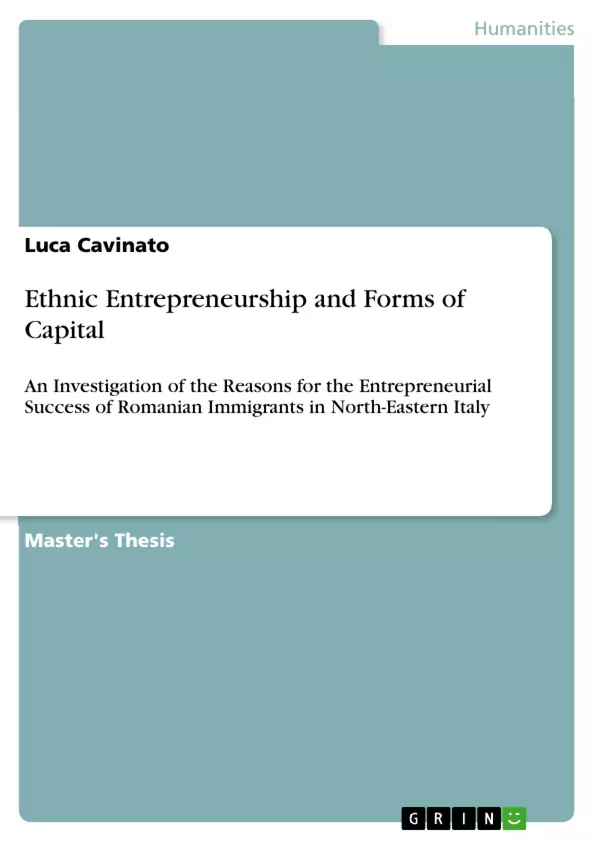The phenomenon of ethnic entrepreneurship does not seem to flourish in Italy when compared with other European countries. An exception is provided by the Romanian group. Specifically, this community seems to be extremely successful on the entrepreneurial level, not only because of the large number of firms they established in the territory, but also because of their rapid and extensive growth in recent years. This phenomenon is interesting and puzzling when considering the discriminatory attitudes of the Italian public opinion towards Romanians and the contradictory Italian immigration policies.
This thesis intends to disentangle the reasons for the entrepreneurial success of Romanians in Italy, taking into consideration the specific location of Padua. In doing so, this study contributes to the debate on ethnic entrepreneurship, by developing the understanding of the multiplicity of factors behind this phenomenon.
Given the scope, a qualitative approach was adopted. Specifically, the core of this thesis is a community-based fieldwork carried out in Padua. Five Romanian entrepreneurs in the territory were carefully sampled and interviewed. Subsequently, their answers have been interpreted, analysed and discussed.
The results suggest that several factors contribute to the entrepreneurial careers of Romanians in Padua. First, the economic landscape seems to be beneficial thanks to abundant market opportunities and to the large presence of SMEs. Second, the characteristics of the Romanian community in Italy are important for their success. Specifically, they seem to be rich in human, cultural and social capital, which hence represent crucial fostering factors for their entrepreneurial achievements. Third, the accession of Romania into the EU in 2007 resulted to be highly related with this phenomenon, as it triggered the proliferation of Romanian firms in the territory. Lastly, the presence of firms from North-Eastern Italy in Romania and the local supportive institutions established in Padua marginally contribute to this phenomenon.
Altogether, this research conforms to previous studies on ethnic entrepreneurship. Specifically, in line with the mixed-embeddedness approach elaborated by Kloosterman and Rath, this thesis suggests that a throughout analysis of this phenomenon needs to take into consideration not only the ethnic group, but also the socio-economic and legal environment of the host country with its institutions.[...]
Inhaltsverzeichnis (Table of Contents)
- Abstract
- 1 Introduction
- 2 Theoretical Framework
- 2.1 The Importance of Capital in Entrepreneurship
- 2.2 Forms of Capital and Their Interplay
- 2.2.1 Economic Capital
- 2.2.2 Social Capital
- 2.2.3 Cultural Capital
- 2.2.4 Human Capital
- 2.3 Ethnic Entrepreneurship and the Role of Capital
- 3 Methodology and Research Design
- 3.1 Methodology
- 3.2 Research Design
- 3.2.1 Data Collection Methods
- 3.2.2 Sampling Strategy
- 3.2.3 Data Analysis
- 4 Findings and Analysis
- 4.1 The Role of Economic Capital
- 4.2 The Role of Social Capital
- 4.3 The Role of Cultural Capital
- 4.4 The Role of Human Capital
- 4.5 Interplay of Forms of Capital
- 5 Discussion
- 6 Conclusion
Zielsetzung und Themenschwerpunkte (Objectives and Key Themes)
This study aims to investigate the reasons for the entrepreneurial success of Romanian immigrants in North-Eastern Italy, focusing on the role of different forms of capital. The research seeks to explore how economic, social, cultural, and human capital contribute to the entrepreneurial success of this immigrant group. The key themes explored in this thesis include:- The importance of capital in entrepreneurship
- The different forms of capital and their interplay
- The role of ethnic entrepreneurship in immigrant communities
- The specific challenges and opportunities faced by Romanian immigrants in Italy
- The contribution of various forms of capital to the entrepreneurial success of Romanian immigrants.
Zusammenfassung der Kapitel (Chapter Summaries)
- Chapter 1: Introduction: This chapter introduces the topic of ethnic entrepreneurship and the specific context of Romanian immigrants in North-Eastern Italy. It outlines the research question, the objectives of the study, and the theoretical framework employed.
- Chapter 2: Theoretical Framework: This chapter delves into the theoretical framework underlying the research. It discusses the importance of capital in entrepreneurship, defines different forms of capital (economic, social, cultural, and human), and explores the interplay between these forms of capital.
- Chapter 3: Methodology and Research Design: This chapter provides a detailed overview of the methodology and research design used in the study. It outlines the data collection methods, sampling strategy, and data analysis techniques employed.
- Chapter 4: Findings and Analysis: This chapter presents the findings of the research, analyzing the role of each form of capital in the entrepreneurial success of Romanian immigrants in North-Eastern Italy.
- Chapter 5: Discussion: This chapter discusses the implications of the research findings, placing them in a broader theoretical and contextual framework.
Schlüsselwörter (Keywords)
This study explores the intersection of ethnic entrepreneurship, forms of capital (economic, social, cultural, and human), and the experiences of Romanian immigrants in North-Eastern Italy. It analyzes the impact of various forms of capital on entrepreneurial success and examines the challenges and opportunities faced by this immigrant group. Key concepts include immigrant entrepreneurship, social capital, cultural capital, human capital, and the interplay of these forms of capital in a specific context.- Citation du texte
- Luca Cavinato (Auteur), 2011, Ethnic Entrepreneurship and Forms of Capital, Munich, GRIN Verlag, https://www.grin.com/document/189522



